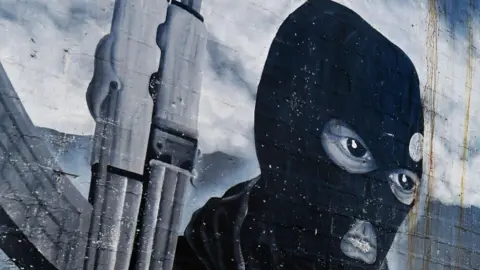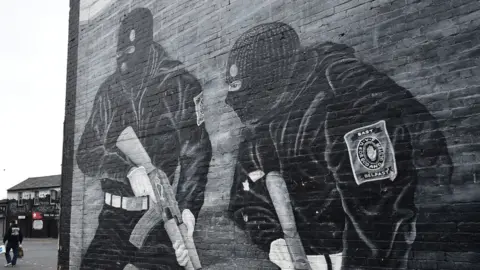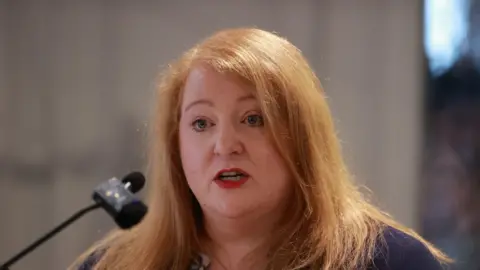Young people still experience paramilitary-related trauma
 Getty Images
Getty ImagesYoung people in Northern Ireland continue to experience trauma linked to paramilitary activity almost 27 years after the Good Friday Agreement.
That's according to new research commissioned by the executive programme on paramilitarism and organised crime.
The study also highlighted that Troubles-related trauma was disproportionately concentrated in socio-economically disadvantaged communities.
The research was led by Dr Colm Walsh from Queen's University Belfast alongside academics from Ulster University, Impact Research Centre and the Regional Trauma Network.
The study found that 60% of the adult population in Northern Ireland reports at least one adverse childhood experience (ACE), with nearly one in five experiencing four or more incidents.
More specifically, 30% of respondents reported conflict-specific adversities, including witnessing violence (47.5%), receiving paramilitary threats (12.2%), and conflict-related bereavement (8.7%).
'Adversity is highly prevalent'
 Getty Images
Getty ImagesSpeaking to BBC News NI, Dr Walsh, said: "As you would expect, people in the older age groups are much more likely to say that they have experienced conflict-related trauma."
What he described as "interesting" and "contrary to what you would assume" is that there was still exposure among younger age groups, such as 18 to 24-year-olds.
"We still see them reporting that they've been exposed to conflict-related violence, directly and indirectly, as well as paramilitary threats, which is kind of fascinating," he added.
"It's really interesting that we still see this exposure [in younger individuals]."
Dr Walsh said those who are exposed to conflict-related trauma are "more likely to develop complex mental health issues", such as post-traumatic stress disorder (PTSD).
He added individuals are also more likely to engage in risk-taking behaviour, such as substance abuse, and are more likely to "exclude themselves and overall not function very well".
He said the findings highlight that "adversity in Northern Ireland is highly prevalent and impactful" and is a "burden that cuts across all of our systems – health, justice, education, communities".
"There's almost a cascading knock-on effect of difficulty, harm clusters, that is what we see."
'Groundbreaking research'
 PA Media
PA MediaThere are few other studies like this in post-conflict settings such as Northern Ireland.
Researchers surveyed 1,200 participants from Northern Ireland.
Speaking on BBC News NI programme Good Morning Ulster, Justice Minister Naomi Long described its findings as "stark and disappointing" but "at some levels... unsurprising".
"This research really is groundbreaking in the sense it is the first time we have looked at the impact on people's health and wellbeing", which could inform policy and delivery across the Executive, she explained.
"If we are able to direct towards early intervention and support for victims then we may be able to offset many of the long term costs of these particular harms", said Ms Long.
She said the harms of continued paramilitary activity on communities includes risk taking behaviours, high levels of alcohol consumption and serious and complex mental health issues.
These harms "cost the health service and public services a huge amount of money", she said.
Ms Long added that trauma can be "passed on from generation to generation" and has a "knock on impact" on people's children and the rest of the family.
"What this report does is give us a real basis to challenge the existence and operation of paramilitary organisations within our communities by holding up a mirror and showing the harm that they are causing", she added.
'Normalisation of violence'
Stephen Hughes is a youth worker at St Peter's Immaculata Youth Centre in west Belfast and a member of the 'Stop Attacks' pressure group.
He said that what he is seeing is "almost a normalisation o f violence" in Northern Ireland.
"What sort of society are we that in 30 years we haven't dealt with these organisations?" he asked.
"We need to stop calling them paramilitaries. We are almost dressing them with a respectability of some sort of political agenda. They are purely criminal."
He told Good Morning Ulster: "87 children under the age of 18 have been shot by paramilitaries since the ceasefire and thousands have been beaten. The youngest was 10 years of age."
He said that violence and ACE is "not a policing issue solely" but that it needs to be tackled as a "health related issue".
"We can't police our way out of this problem, this is a complex problem that requires a complex intervention."
He added: "It takes four generations to mend a toxic trauma. We are two generations into the ceasefire and we are still retraumatising communities and individuals and making this problem worse."
